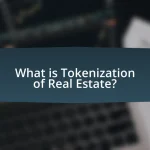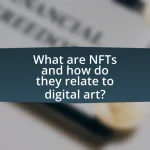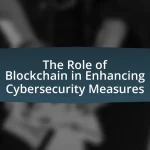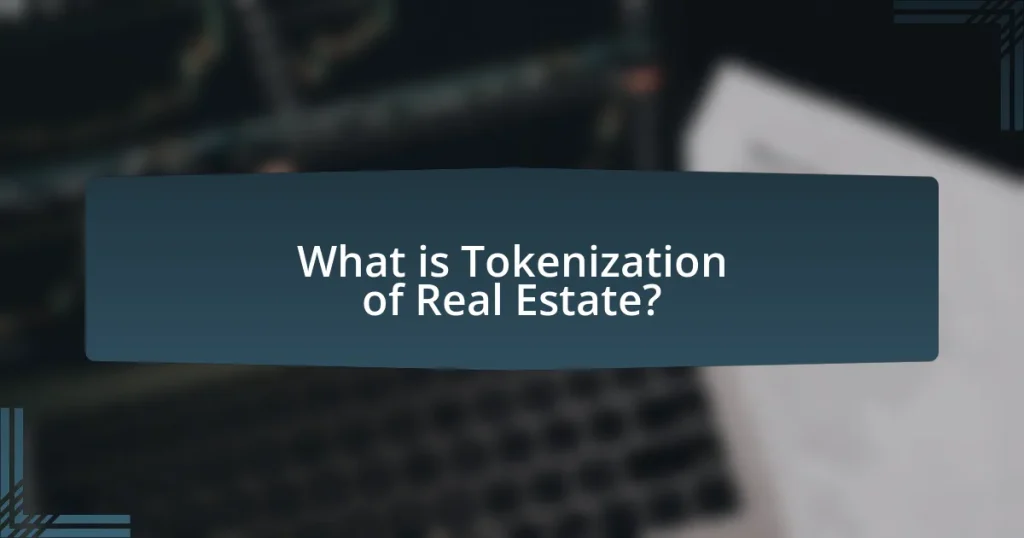Tokenization of real estate is the process of converting property ownership rights into digital tokens on a blockchain, facilitating fractional ownership and enhancing liquidity in real estate investments. This innovative approach lowers barriers to entry for investors, allowing participation with smaller capital requirements and streamlining transactions through smart contracts. Key features include increased accessibility, transparency, and the potential to unlock significant value in the real estate market. The article explores the mechanisms behind tokenization, its regulatory considerations, and the implications for investment strategies, while also addressing the challenges and best practices for engaging with tokenized real estate opportunities.

What is Tokenization of Real Estate?
Tokenization of real estate refers to the process of converting ownership rights in a property into digital tokens on a blockchain. This method allows for fractional ownership, enabling multiple investors to own a share of a property, which increases liquidity and accessibility in real estate investments. According to a report by Deloitte, tokenization can streamline transactions, reduce costs, and enhance transparency in the real estate market, making it a transformative approach for property investment.
How does tokenization transform traditional property investment?
Tokenization transforms traditional property investment by enabling fractional ownership, which lowers the barrier to entry for investors. This process allows real estate assets to be divided into digital tokens, representing shares of the property, thus making it accessible to a broader range of investors. For instance, a property valued at $1 million can be tokenized into 1,000 tokens worth $1,000 each, allowing multiple investors to participate without needing substantial capital. Additionally, tokenization enhances liquidity, as these tokens can be traded on blockchain platforms, facilitating quicker transactions compared to traditional real estate sales that often involve lengthy processes. This shift is supported by the growing adoption of blockchain technology, which provides transparency and security in transactions, further validating the transformation of property investment through tokenization.
What are the key features of tokenized real estate?
Tokenized real estate features fractional ownership, enhanced liquidity, and increased accessibility. Fractional ownership allows multiple investors to own a share of a property, lowering the barrier to entry for real estate investment. Enhanced liquidity is achieved through the ability to buy and sell tokens on secondary markets, making it easier for investors to exit their investments compared to traditional real estate transactions. Increased accessibility is facilitated by blockchain technology, which enables global participation and reduces the need for intermediaries, thus streamlining the investment process. These features collectively transform property investment by democratizing access and improving transaction efficiency.
How does tokenization enhance liquidity in real estate markets?
Tokenization enhances liquidity in real estate markets by converting physical assets into digital tokens that can be easily traded on blockchain platforms. This process allows for fractional ownership, enabling investors to buy and sell smaller portions of real estate assets, which increases the number of potential buyers and sellers in the market. As a result, properties that were traditionally illiquid can now be traded more readily, reducing the time and cost associated with transactions. For instance, a study by the World Economic Forum indicates that tokenization could potentially unlock $4 trillion in real estate value by making it more accessible and liquid.
Why is tokenization gaining popularity in real estate?
Tokenization is gaining popularity in real estate primarily due to its ability to enhance liquidity and accessibility for investors. By converting physical assets into digital tokens on a blockchain, real estate investments can be fractionalized, allowing a broader range of investors to participate with lower capital requirements. This democratization of investment opportunities is supported by the increasing adoption of blockchain technology, which provides transparency and security in transactions. Additionally, tokenization can streamline the buying and selling process, reducing transaction costs and time, which further attracts investors looking for efficient investment avenues.
What advantages does tokenization offer to investors?
Tokenization offers investors increased liquidity, fractional ownership, and enhanced accessibility. By converting real estate assets into digital tokens, investors can buy and sell fractions of properties, which lowers the barrier to entry and allows for diversification across multiple investments. Additionally, tokenization can streamline transactions through smart contracts, reducing costs and time associated with traditional real estate transactions. This innovative approach has the potential to democratize access to real estate investments, making them available to a broader range of investors.
How does tokenization democratize access to real estate investments?
Tokenization democratizes access to real estate investments by enabling fractional ownership, allowing individuals to invest in properties with lower capital requirements. This process utilizes blockchain technology to create digital tokens that represent shares of real estate assets, making it possible for a broader range of investors to participate in the market. For instance, traditional real estate investments often require substantial upfront capital, typically hundreds of thousands of dollars, which limits access to wealthy individuals. In contrast, tokenization can lower the minimum investment to as little as a few hundred dollars, thus opening opportunities for middle-class investors. Additionally, tokenization enhances liquidity by allowing these tokens to be traded on secondary markets, further increasing accessibility and investment flexibility.

What are the mechanisms behind Tokenization of Real Estate?
The mechanisms behind tokenization of real estate involve the conversion of property rights into digital tokens on a blockchain. This process typically includes the creation of a legal framework that defines ownership and rights associated with the real estate asset, followed by the issuance of tokens that represent fractional ownership.
Smart contracts are utilized to automate transactions and enforce agreements, ensuring transparency and security. Additionally, the use of blockchain technology provides a decentralized ledger that records all transactions, enhancing trust among investors. According to a report by Deloitte, tokenization can increase liquidity in real estate markets by allowing smaller investors to participate in property investments, thus broadening access to capital.
How does the process of tokenization work?
Tokenization is the process of converting ownership rights of a physical asset, such as real estate, into digital tokens on a blockchain. This involves creating a digital representation of the asset, which can be divided into smaller units, allowing for fractional ownership. Each token represents a share of the asset, enabling multiple investors to own a portion of the property. The use of blockchain technology ensures transparency, security, and immutability of ownership records, facilitating easier transactions and reducing the need for intermediaries. This method has been validated by various real estate projects that have successfully utilized tokenization to democratize access to property investments, making it more accessible to a broader range of investors.
What technologies are used in the tokenization process?
The technologies used in the tokenization process include blockchain, smart contracts, and cryptographic algorithms. Blockchain serves as the foundational technology, providing a decentralized and secure ledger for recording ownership and transactions. Smart contracts automate the execution of agreements and ensure compliance with predefined conditions, enhancing efficiency and reducing the need for intermediaries. Cryptographic algorithms secure the data and transactions, ensuring that only authorized parties can access sensitive information. These technologies collectively enable the fractional ownership and transfer of real estate assets, making property investment more accessible and efficient.
How are tokens created and managed on blockchain platforms?
Tokens are created on blockchain platforms through smart contracts, which are self-executing contracts with the terms of the agreement directly written into code. These smart contracts define the token’s properties, such as supply, ownership, and transferability, and are deployed on the blockchain, ensuring transparency and security. Management of tokens involves tracking ownership and transactions on the blockchain ledger, which provides an immutable record of all token movements. This process allows for efficient trading and fractional ownership, particularly relevant in real estate tokenization, where properties can be divided into smaller, tradable units. The use of established standards, such as ERC-20 for fungible tokens or ERC-721 for non-fungible tokens on Ethereum, further facilitates interoperability and ease of management across different platforms.
What regulatory considerations are involved in tokenization?
Regulatory considerations in tokenization primarily involve compliance with securities laws, anti-money laundering (AML) regulations, and consumer protection standards. Tokenized assets may be classified as securities, requiring adherence to regulations set forth by authorities such as the Securities and Exchange Commission (SEC) in the United States. This classification mandates registration of the tokens or qualification for an exemption, ensuring that investors receive necessary disclosures. Additionally, tokenization platforms must implement AML measures to prevent illicit activities, which includes verifying the identities of participants and monitoring transactions. Compliance with these regulations is crucial for maintaining legal integrity and protecting investors in the evolving landscape of real estate investment.
How do regulations differ across various jurisdictions?
Regulations regarding the tokenization of real estate differ significantly across various jurisdictions, primarily due to differing legal frameworks, compliance requirements, and definitions of securities. For instance, in the United States, the Securities and Exchange Commission (SEC) classifies tokenized real estate as securities, requiring compliance with federal securities laws, while jurisdictions like Switzerland have established a more favorable regulatory environment that allows for greater flexibility in token offerings. Additionally, countries such as Singapore have implemented specific guidelines for security token offerings, promoting innovation while ensuring investor protection. These variations impact how real estate assets can be tokenized, marketed, and traded, influencing the overall investment landscape in each jurisdiction.
What compliance challenges do tokenized real estate projects face?
Tokenized real estate projects face significant compliance challenges primarily related to regulatory frameworks and securities laws. These projects must navigate complex legal landscapes that vary by jurisdiction, often requiring adherence to both local and international regulations. For instance, tokenized assets may be classified as securities, necessitating compliance with the Securities and Exchange Commission (SEC) regulations in the United States, which includes registration requirements and disclosure obligations. Additionally, anti-money laundering (AML) and know your customer (KYC) regulations impose further compliance burdens, as projects must ensure proper identification and verification of investors to prevent illicit activities. The lack of clear regulatory guidelines in many regions can also lead to uncertainty, making it difficult for developers to ensure compliance and avoid potential legal repercussions.

What are the implications of Tokenization of Real Estate?
The implications of tokenization of real estate include increased liquidity, fractional ownership, and enhanced accessibility for investors. Tokenization allows real estate assets to be divided into smaller, tradable units, enabling a broader range of investors to participate in the market. This process can lead to a more efficient market by facilitating quicker transactions and reducing barriers to entry, as evidenced by platforms like RealT, which has successfully enabled fractional ownership of properties through blockchain technology. Additionally, tokenization can improve transparency and security in transactions, as blockchain records provide immutable proof of ownership and transaction history.
How does tokenization impact real estate investment strategies?
Tokenization significantly enhances real estate investment strategies by enabling fractional ownership, which lowers the barrier to entry for investors. This process allows multiple investors to own a share of a property, thereby increasing liquidity and diversifying investment portfolios. For instance, a property valued at $1 million can be tokenized into 1,000 tokens, each representing a $1,000 investment, making it accessible to a broader range of investors. Additionally, tokenization streamlines transactions through blockchain technology, reducing costs and increasing transparency. According to a report by Deloitte, tokenization can reduce transaction costs by up to 90%, making real estate investments more efficient and attractive.
What new investment opportunities arise from tokenization?
Tokenization creates new investment opportunities by enabling fractional ownership of real estate assets. This process allows investors to purchase smaller shares of properties, lowering the barrier to entry for individuals who may not have sufficient capital to invest in entire properties. For instance, a property valued at $1 million can be tokenized into 1,000 tokens, each representing a $1,000 investment, thus democratizing access to real estate markets. Additionally, tokenization enhances liquidity, as these tokens can be traded on secondary markets, providing investors with the ability to buy and sell their stakes more easily compared to traditional real estate investments. This shift is supported by the growing trend of blockchain technology adoption, which facilitates secure and transparent transactions, further validating the potential of tokenization in transforming property investment landscapes.
How does tokenization affect property valuation and appraisal?
Tokenization significantly impacts property valuation and appraisal by enhancing liquidity and enabling fractional ownership. This process allows real estate assets to be divided into digital tokens, making it easier for investors to buy and sell portions of properties. As a result, the market becomes more accessible, potentially increasing demand and altering traditional valuation methods. For instance, properties that were previously illiquid can now be appraised based on their tokenized market value, which reflects real-time trading activity and investor sentiment. This shift can lead to more dynamic and transparent property valuations, as evidenced by platforms like RealT and Harbor, which have successfully implemented tokenization in real estate transactions.
What challenges and risks are associated with tokenization?
Tokenization faces several challenges and risks, including regulatory uncertainty, security vulnerabilities, and market volatility. Regulatory uncertainty arises because the legal framework surrounding tokenized assets is still evolving, which can lead to compliance issues for issuers and investors. Security vulnerabilities are a significant concern, as tokenized assets can be susceptible to hacking and fraud, potentially resulting in financial losses. Market volatility poses risks as the value of tokenized assets can fluctuate dramatically, influenced by factors such as investor sentiment and market conditions. These challenges highlight the need for robust regulatory frameworks, enhanced security measures, and market stability to mitigate risks associated with tokenization in real estate investment.
What are the potential pitfalls for investors in tokenized real estate?
Investors in tokenized real estate face several potential pitfalls, including regulatory uncertainty, market volatility, and liquidity issues. Regulatory uncertainty arises because the legal framework governing tokenized assets is still evolving, which can lead to compliance risks and potential legal challenges. Market volatility can affect the value of tokenized real estate, as fluctuations in the broader cryptocurrency market may impact investor sentiment and asset prices. Additionally, liquidity issues may arise since tokenized real estate investments can be less liquid than traditional real estate, making it difficult for investors to sell their tokens quickly or at a favorable price. These factors highlight the complexities and risks associated with investing in tokenized real estate.
How can investors mitigate risks in tokenized investments?
Investors can mitigate risks in tokenized investments by conducting thorough due diligence on the underlying assets and the platforms facilitating the tokenization. This involves assessing the legal framework, understanding the asset’s valuation, and evaluating the credibility of the token issuer. For instance, a study by the World Economic Forum highlights that transparency and regulatory compliance are crucial for reducing risks associated with digital assets. Additionally, diversifying investments across multiple tokenized assets can spread risk and minimize potential losses.
What are best practices for engaging with Tokenization of Real Estate?
Best practices for engaging with tokenization of real estate include conducting thorough due diligence, ensuring compliance with regulations, and utilizing secure blockchain technology. Conducting due diligence involves assessing the property’s value, legal status, and market conditions to make informed investment decisions. Compliance with regulations is crucial, as real estate tokenization must adhere to securities laws and local regulations to avoid legal issues. Utilizing secure blockchain technology ensures transparency and security in transactions, which builds trust among investors. According to a report by Deloitte, the integration of blockchain in real estate can enhance transaction efficiency and reduce costs, validating the importance of these practices.
How should investors approach tokenized real estate opportunities?
Investors should approach tokenized real estate opportunities by conducting thorough due diligence on the underlying assets and the technology used for tokenization. This involves evaluating the property’s location, market conditions, and potential for appreciation, as well as understanding the legal framework governing tokenized assets. According to a report by Deloitte, the tokenization of real estate can enhance liquidity and accessibility, but investors must also assess the risks associated with blockchain technology and regulatory compliance. By focusing on these factors, investors can make informed decisions that align with their investment goals.
What resources are available for learning about tokenization in real estate?
Resources for learning about tokenization in real estate include online courses, academic papers, industry reports, and webinars. Online platforms like Coursera and Udemy offer courses specifically focused on blockchain and real estate tokenization. Academic papers, such as “Real Estate Tokenization: A New Paradigm for Property Investment” published in the Journal of Property Investment & Finance, provide in-depth analysis and case studies. Industry reports from organizations like Deloitte and PwC also cover trends and implications of tokenization in real estate. Additionally, webinars hosted by real estate and blockchain experts offer practical insights and discussions on the topic.










